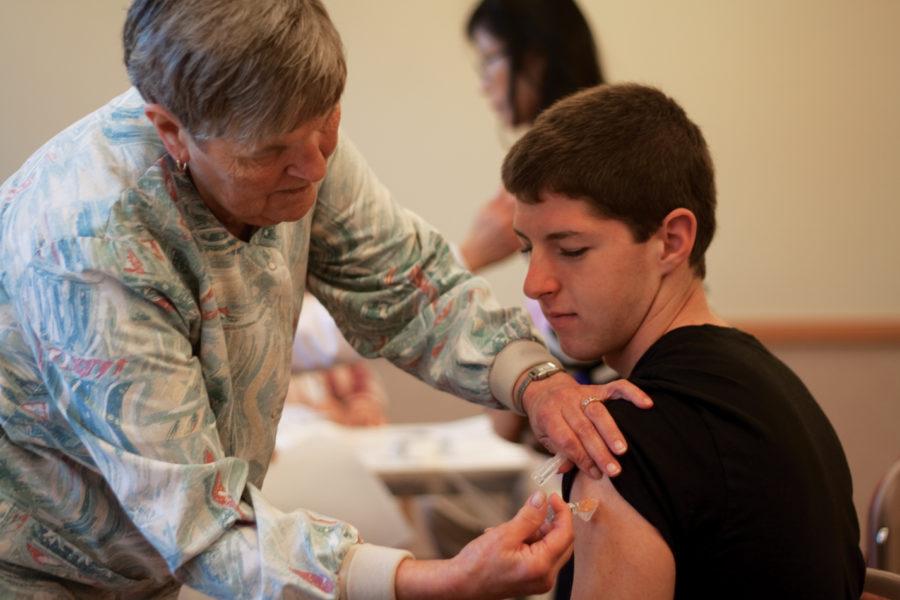Vaccination is best form of flu prevention
Photo: Kelsey Kremer/Iowa State Daily
Perry Martens, freshman in mechanical engineering, gets a flu shot Thursday, Sept. 30 in the Union Drive Community Center. Thursday was the last day the Thielen Student Health Center was offering flu shots in the UDCC, but they will still be giving flu shots and mists on Wednesday and Saturday mornings thru October.
October 24, 2010
Vaccination is the best action to take to avoid contracting the flu, according to the U.S. Department of Health and Human Services website.
Last year’s H1N1 epidemic affected “huge numbers” of people at Iowa State, said Laura Knowles, Thielen Student Health Center program coordinator.
The Centers for Disease Control and Prevention expects a lot of illness in the 2010-2011 flu season, which begins in October and can last as late as May, usually peaking around January.
The root of the first pandemic in 40 years, the H1N1 virus is now part of regular vaccinations along with influenza A H3N2 virus and influenza B virus – the three viruses predicted to cause the most illness in the U.S. this flu season.
Unlike last year when the H1N1 vaccine and the seasonal vaccine had to be taken separately, this flu season, people only need to have one vaccine. Everyone 6 months and older should get vaccinated, the CDC recommends.
Knowles referred students to the CDC website, which also features a flu map to show where the flu is hitting hardest.
“We take their guidelines and implement them here,” Knowles said.
Knowles recommended cleaning common items such as doorknobs, faucet handles, flush handles and phones with disinfectant wipes or spray to keep the risk of spreading down. You can also keep little packets of disinfectant wipes with you, she suggested.
“Last year we encouraged lab monitors to clean keyboards and common surfaces in labs,” Knowles said.
Although not a substitute for getting vaccinated, antiviral drugs are about 70 to 90 percent effective against viruses which are not resistant to antiviral medication.
Flu spreads up to six feet from people who have the flu, mainly when they cough, sneeze or talk. Since the flu is contagious, it can spread even before the infected person shows any symptoms.
Runny nose, stuffy nose, coughing, chills and fever are symptoms of the flu. If you get the flu, the CDC recommends taking antiviral prescription medicine, staying home until 24 hours after you no longer have a fever and limiting contact with others as much as possible to avoid infecting them.
The CDC advises covering your nose and mouth with a tissue when you cough or sneeze, washing your hands often with soap and water, avoiding touching your eyes, nose and mouth and trying to avoid close contact with sick people to prevent the spread of the flu.
Since the start of flu vaccine clinics this season at Iowa State, about 1,500 vaccines have been given. In November vaccines will be offered on Wednesday mornings and in later months will be given on an appointment basis.
Thielen will also accommodate walk-ins, although they might have to wait, Knowles siad. With the flu season around the corner, she stressed the importance of getting vaccinated.
“Even the vaccinations aren’t 100 percent effective, but some protection is better than none,” Knowles said.

















